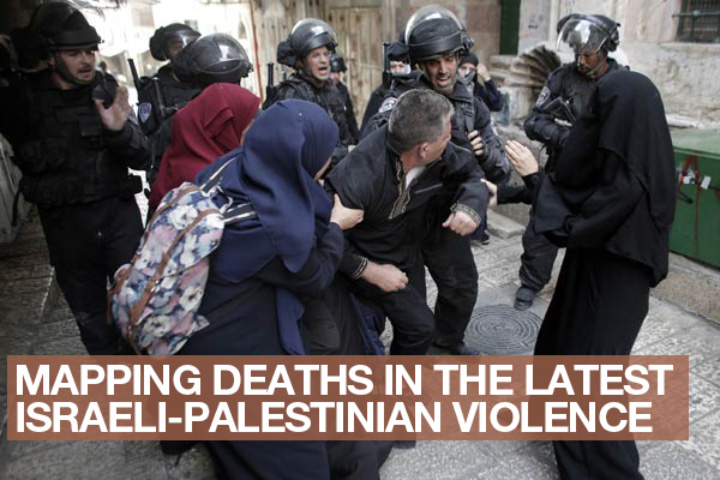Medics risk lives on front lines of West Bank clashes
Amid a wave of violence in Israel and Palestine, dozens of medics have been injured while trying to save others.

Ramallah, occupied West Bank – A rubber-coated steel bullet slams into the side of Khalid Abu Qare’s ambulance, leaving a large dent.
Clashes have broken out between Palestinian protesters and the Israeli army in front of Israel’s Ofer prison on the outskirts of Ramallah. Beyond a fog of tear gas, orange flames and black smoke from burning tires, a Palestine Red Crescent Society (PRCS) ambulance crew is waiting to treat injured protesters. Abu Qare is among them.
Keep reading
list of 4 itemsWoman, seeking loan, wheels corpse into Brazilian bank
UK set to ban tobacco sales for a ‘smoke-free’ generation. Will it work?
Poland lawmakers take steps towards liberalising abortion laws
“Medical staff and ambulances are supposed to be protected under international law,” he told Al Jazeera, “but not everything that’s supposed to be happens in real life.”
READ MORE: How a normal day ended in tragedy for Palestinian teens
Abu Qare, 20, a full-time student at Birzeit University, is among 150 Palestinian PRCS volunteer medics in the West Bank who are trained to treat injured protesters during violent confrontations with Israeli security forces. The volunteer medics work on the frontlines of clashes, often risking their own lives to save others.
“Since October, PRCS has been at emergency level,” said Abu Qare, who has been a volunteer with the society for six years. “So you have to be on standby 24 hours. You don’t know what will happen, but you have to be ready for anything.”
|
|
According to the United Nations Office for the Coordination of Humanitarian Affairs, a sharp increase in violent confrontations between Palestinian protesters and Israeli security forces across the occupied West Bank, East Jerusalem and Gaza in recent weeks has resulted in more than 11,200 injuries to Palestinians. Of those victims, more than 200 were children. Dozens of the injuries resulted from live ammunition.
This escalation in violence has placed mounting pressure on the volunteer medics at PRCS, who are on-call 24 hours a day, said Erab Fuqaha, a spokesperson for the organisation in Ramallah.
“Volunteer medics are under pressure, not only from the work they do, from what they encounter with the Israeli security forces, but also from their own families … who are concerned for their safety,” Fuqaha told Al Jazeera.
As part of the PRCS programme, medics receive first aid and emergency technician training, which allows them to treat severe tear gas inhalation or gunshot wounds. “We can deal with any emergency that can happen,” Abu Qare said, before dashing off to treat a protester shot with live ammunition.
The medics treat the injured regardless of nationality, ethnicity or religion – including Israeli soldiers, settlers and civilians.
I think applicants are trying to find ways to do something for Palestine.
Over the past two months, Israeli security forces have disrupted medics’ work hundreds of times, according to data provided by the PRCS. More than 130 of the organisation’s medical staff have been injured by tear gas, steel-coated rubber bullets or live ammunition in the course of carrying out their duties. In the same period, almost half of the society’s 160 ambulances were damaged by Israeli security forces, and PRCS medics were prevented from reaching patients in 76 instances, resulting in at least one death.
“Our medics have been shot at with rubber-coated steel bullets and tear gas,” Fuqaha said. “We have a number of cases where our medics were physically assaulted [by Israeli forces] in Jerusalem, Hebron and here in Ramallah. These are the main forms of assault they experience in the field. But you must also take into consideration the verbal abuse they experience.”
Still, Abu Qare says medics remain determined to continue helping people.
“Even if our staff are injured at night, in the morning they are ready to help,” he said. “That’s what gives us the motivation to continue.”
READ MORE: Israeli gunfire leaves two more Palestinians dead
In one high-profile incident, PRCS medical staff and volunteers were pepper-sprayed by Israeli security forces as they tried to reach a Palestinian youth who had been run over by an Israeli military jeep during confrontations near Ramallah. The incident was caught on camera by journalists. Abu Qare was among those pepper-sprayed.
Under articles 20 and 21 of the fourth Geneva Convention, to which the state of Israel is a signatory, medical staff operating in occupied territories must be “respected and protected”.

However, since 2000, 25 PRCS medical staff and volunteers have died on duty. Most recently, two staff died during Israel’s 2014 war on Gaza.
“Israeli occupying forces do not distinguish between medical staff and other civilians,” Tahseen Elayyan, the head of monitoring and documentation for the Palestinian rights group al-Haq, told Al Jazeera. “Israeli occupying forces do not take any steps to protect medical staff. On the contrary, they are sometimes targeted directly. During the past few years, al-Haq has documented cases where medical personnel were targeted directly and killed.”
An Israeli army spokesperson told Al Jazeera that it was unaware of any instances in which Israeli security forces had harmed PRCS medical staff or ambulances. They would not comment on whether Israeli forces take precautions to protect medical staff during clashes with Palestinian protesters.
Despite the risks, the number of young Palestinians applying to volunteer with Red Crescent has climbed dramatically in recent months amid a wave of violence in the occupied West Bank, Fuqaha said.
“Applicants admire these young volunteers for the courage they have, and how they really risk their lives to help the people,” Fuqaha added. “I think applicants are trying to find ways to do something for Palestine.”
Follow Jonathan Brown on Twitter: @jonathaneebrown